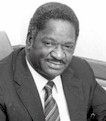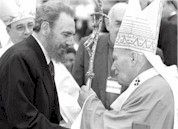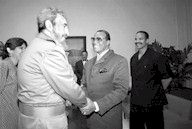|
|
|
The Republican governor�s Oct. 23-27 humanitarian mission resulted in a Cuban youngster receiving needed, free medical aid in the United States and nearly $2 million in food, medical and school supplies were distributed during the trip, according to the governor�s office. Mr. Ryan was the first governor to visit Cuba in 40 years and led a small army of major business leaders, journalists, state political and religious leaders. �If you�re going to resolve the problems, then you can�t do it in isolationism, we have to have some communication and some dialog,� said Gov. Ryan, speaking Oct. 31, during a live appearance on C-SPAN. �We have created that with this trip. We started some dialog that hadn�t been going on for over 40 years, or almost 40 years. And it was high time that somebody from America made the trip and broke the ice. Hopefully you�ll see other governors and maybe other elected officials, or maybe just humanitarian groups will start to go to Cuba. We feel like we�ve built some bridges there and would be hopeful that other people would go down,� he said, in between taking questions via telephone calls from listeners. Gov. Ryan stressed that he never forgot that Mr. Castro was a dictator during a seven-hour dinner meeting and in any discussions. But, he added, it also didn�t make sense to try to initiate a relationship by insulting everyone in the country. Though he called for an end to the embargo in words to reporters Oct. 25, Gov. Ryan also met with dissidents and appealed for the release of some jailed Cubans. Mr. Ryan, speaking on C-SPAN, noted polls show Americans favor ending the food and medical embargo against Cuba. �We think the Cuban government has demonstrated it is legitimately elected and has the peoples� interest at heart,� said Rev. Lucius Walker, of Pastors for Peace in New York. It is good for as many people as possible to go to Cuba and see the country for themselves, he said. �I think people begin to see that this is not a police state under which people are repressed,� Rev. Walker continued. The Cuban people are happy and appreciative of what their government is doing for them, and enjoy a �love relationship� with President Castro, said Rev. Walker, whose group advised the governor before the trip. Pastors for Peace opposes the U.S.-led embargo of Cuba, and as a matter of conscience refuses to apply for State Department licenses needed to enter the country. For 11 years, Pastors for Peace has been working to end the U.S. blockade and provide humanitarian aid to Cuba. The group has delivered 1,700 tons of aid, taken 10 caravans and thousands of people to visit Cuba.
Unless there is some other compelling reasons, the embargo should be looked at, said Mr. Jones. The United States deals with former enemy Russia, Vietnam, China and the State Department admits Cuba is no longer a military threat to the United States, he said. �I�m opposed to oppression. I�m opposed to suppressing one�s rights, but they suppress rights in China and we don�t have an embargo against them and the same in Russia. Not unless there is some other overriding compelling issue, I don�t know why the embargo still exists,� Mr. Jones explained. State Department restrictions prevented the group from talking directly about trade with Cuban officials, said Mr. Jones. But speaking from his Chicago office, he told The Final Call, a diplomatic solution to the impasse could �have a profound impact, not only for our farmers, but if other investors can come in and rebuild that nation�just like we poured money into Russia. We have major corporations going into China�with that investment of capital, the people will benefit along with the trade aspect of it. It would be great for business, also the tourism industry which the country could really benefit from.� But there is a faction based in Miami, those �elites� who fled when President Castro took over, who want to keep the embargo, he said. Mr. Jones said he wasn�t aware of Min. Farrakhan�s 1996 trip. �But I imagine that he (Min. Farrakhan) probably saw what I saw. He saw a people of color, he saw people in need, and he probably saw a people who hold no animosity toward Americans. He probably saw a people who are hurting because of the leadership of that country. ... He�s (Min. Farrakhan) rather controversial, but again, out of controversy that�s when you find who your real leaders are,� Mr. Jones said. Ninoska Perez, a spokesperson for the anti-Castro Cuban American National Foundation in Miami, sees a totally different picture. �To go down to Cuba and simply meet with Castro, ask for the lifting of the embargo and not demand anything in return is absurd,� she said. The embargo could be lifted tomorrow if Mr. Castro would have free elections, respect human rights and let political prisoners go, Ms. Perez argued. The governor took a group of businessmen willing to do business in Cuba that Cubans cannot engage in and that�s not acceptable, she said, comparing the Castro regime to the apartheid regimes in South Africa. �Do you think that just because you go down to Cuba and take one of these companies like Midland Archer, who are dying to do business in Cuba, and bring back a sick child, isn�t that good propaganda for a dictatorship, rather than the first step to be engaged in a dialog where the Cuban government can give something back in return?� she asked. Only sanctions can force Mr. Castro out of power and lifting the embargo doesn�t mean Cuba will change its policies or let citizens own businesses, she added. The Ryan trip, which included a large media contingent and broadcasts from Cuba, received generally favorable press and the State Department was chided for criticizing Mr. Ryan. �The U.S. State Department, which gave its approval for him (Gov. Ryan) and his Illinois entourage to visit Fidel Castro�s Cuba, now suggests that the Ryan mission was somehow ill-advised and unhelpful. Did anyone in the department�s hierarchy actually think that the expedition would not include a predictable reality that Ryan did meet with the communist dictator and does favor an end to the embargo that United States has enforced against Cuba for decades,� an Oct. 29 Chicago Sun-Times editorial said. �The governor is an American citizen. His right to say what he thinks cannot be abridged because he is traveling with the permission of the State Department to a country we do not get along with,� the paper said.
�When a white governor goes for humanitarian purposes they even allow media from the television stations to go. When a Black leader of Min. Louis Farrakhan�s stature goes to Cuba, they not only criticize but they also do not publicize it to the degree that Africans in America will see that the Minister is working on bridging relationships between brothers and sisters in Cuba with brothers and sisters in Africa and other parts of the world,� said Rev. Al Sampson. The Chicago-based pastor and activist accompanied Min. Farrakhan on his World Friendship Tour I that did not include Cuba.
The press reaction to Min. Farrakhan�s trip is similar to mixed reviews Rev. Jackson received upon gaining the release of U.S. servicemen in Yugoslavia and mediation in other places and the attack Ms. Moseley-Braun for visiting Nigeria, said Ron Daniels of the Center for Constitutional Rights in New York. �The Minister, of course, is bringing not just the prospect of investment�he is also bringing a different kind of solidarity. He is in fact coming to express his solidarity with the Cuban revolution. The governor of Illinois no doubt is holding his nose and looking at the dollar bills and saying we need to ignore this part so we can get to the dollars,� said Mr. Daniels. Cardinal George, leader of Catholic Church in Chicago, assigned Bishop Joseph N. Perry to the Cuba trip. Cuba has deep links to the Catholic Church�most Cubans are Catholics�and the trip was a chance to see how the church was doing since a 1991 change in the Cuban constitution offered greater religious freedom, he said. But the �sensitive, delicate� political situation remains to be worked out by U.S. and Cuban officials, he noted. Pope John Paul II did condemn the U.S. embargo as unjust a year-and-half-ago on his visit to Cuba, Bishop Perry said. �We think that it is good, not only that this governor has gone down, but before him the Farm Bureau went down, and the Chamber of Commerce went down. They were all following the Congressional Black Caucus, which led the way. We want other groups to go down so that we can build the kind of support that will back down these (anti-Castro) people in Florida, who try to scare the hell out of everybody (who would befriend Castro),� said a senior CBC member who traveled to Cuba earlier this year. �The embargo has to be undone by Democrats. It will take a vote of Congress to lift the embargo. We realize that we cannot lift the embargo without Democratic majorities in the House and Senate, so we are working to help take back (Democratic control of) the House,� the lawmaker told The Final Call. Ron Daniels, of the Center for Constitutional Rights, believes momentum to end the embargo was building before Cuban planes shot down an anti-Castro Brothers to the Rescue plane two years ago. That incident brought more punitive measures, he noted. At that time anti-embargo forces were driving the policy change push, but now U.S. business forces are pushing for access to Cuba, said Mr. Daniels. The Canadians, the French and others are about to cash-in on changes in Cuba while the embargo locks out U.S. entrepreneurs, he said. Mr. Daniels also sees cracks developing in the hard-line anti-Castro forces in Miami. The hard-liners are out of step with diplomacy favored by world public opinion and much of U.S. public opinion, he said. "I think what the governor�s trip really represents, in many respects, is a major trial balloon. When he goes on that trip, it�s a trial balloon on behalf of that corporate sector that is straining at the leash to get a piece of the investment action in Cuba,� Mr. Daniels said. Photos: #1-Illinois Gov. George Ryan talks to young hospital patients in the William Soler Hospital in Havana, Cuba; #2-Ill. State Senator Emil Jones; #3-Cuban leader Fidel Castro greets Pope John Paul II after the Pope's historic mass in Havana's Plaza of the Revolution, Jan. 25, 1998; #4-Pres. Castro welcomes Min. Farrakhan to Cuba in 1996. |

 CHICAGO�Illinois Gov. George Ryan has joined an impressive
and growing list of world leaders�including Minister Louis Farrakhan,
Pope John Paul II and Nelson Mandela�who have called for diplomatic
solutions to tensions between Fidel Castro�s Cuba and the United
States.
CHICAGO�Illinois Gov. George Ryan has joined an impressive
and growing list of world leaders�including Minister Louis Farrakhan,
Pope John Paul II and Nelson Mandela�who have called for diplomatic
solutions to tensions between Fidel Castro�s Cuba and the United
States. �With the embargo, ordinary people are suffering. They cannot get
the proper medicine, even though the embargo is not supposed to impact
medicine, but it does,� said Emil Jones Jr., Illinois Senate
Democratic leader. Mr. Jones, who was a member of the Ryan delegation,
sees the trip as a positive humanitarian gesture and a chance to meet
Cuban officials and Cuban people.
�With the embargo, ordinary people are suffering. They cannot get
the proper medicine, even though the embargo is not supposed to impact
medicine, but it does,� said Emil Jones Jr., Illinois Senate
Democratic leader. Mr. Jones, who was a member of the Ryan delegation,
sees the trip as a positive humanitarian gesture and a chance to meet
Cuban officials and Cuban people. The favorable media coverage wasn�t lost on observers who saw a
double standard in the way the Ryan visit and Pope John Paul�s 1998
embrace of Mr. Castro was handled versus a trip to Cuba by Min. Louis
Farrakhan in 1996, as part of his World Friendship Tour II. Sen. Carol
Moseley Braun, Rev. Jesse Jackson, and other Black leaders also have
withstood media attacks for trying to find diplomatic solutions with
so-called �rouge� regimes.
The favorable media coverage wasn�t lost on observers who saw a
double standard in the way the Ryan visit and Pope John Paul�s 1998
embrace of Mr. Castro was handled versus a trip to Cuba by Min. Louis
Farrakhan in 1996, as part of his World Friendship Tour II. Sen. Carol
Moseley Braun, Rev. Jesse Jackson, and other Black leaders also have
withstood media attacks for trying to find diplomatic solutions with
so-called �rouge� regimes. Min. Farrakhan goes to Cuba thanking President Castro for the help
given to countries like Angola, who have been hurt by U.S. and European
policies, said Rev. Sampson. �It has been the Castros of life that
have given aid and comfort to the brothers and sisters in the homeland
as they struggle for their liberation,� he said. �Because there are
two different agendas, the media does not want to report the kind of
in-depth work that Min. Farrakhan has been doing to bring us into the
United States of Africa.�
Min. Farrakhan goes to Cuba thanking President Castro for the help
given to countries like Angola, who have been hurt by U.S. and European
policies, said Rev. Sampson. �It has been the Castros of life that
have given aid and comfort to the brothers and sisters in the homeland
as they struggle for their liberation,� he said. �Because there are
two different agendas, the media does not want to report the kind of
in-depth work that Min. Farrakhan has been doing to bring us into the
United States of Africa.�